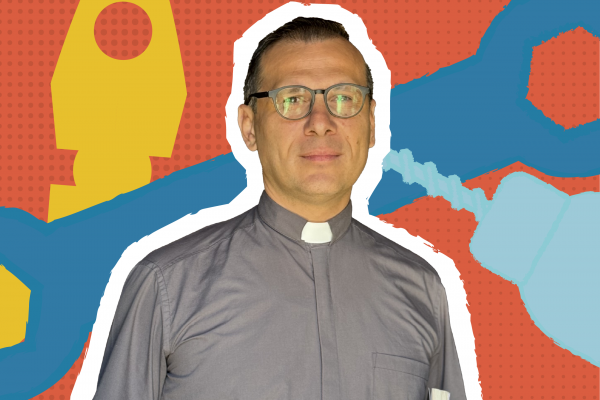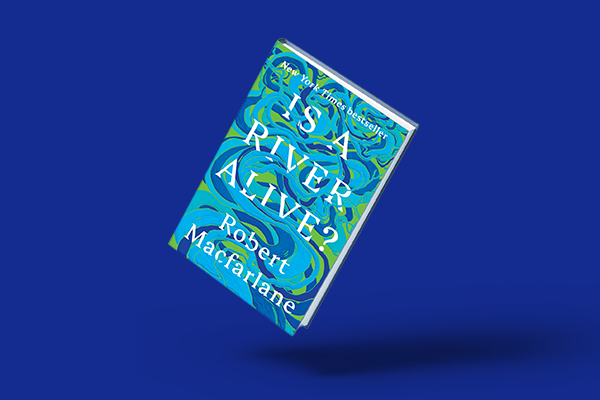This interview is part of The Reconstruct, a weekly newsletter from Sojourners. In a world where so much needs to change, Mitchell Atencio and Josiah R. Daniels interview people who have faith in a new future and are working toward repair. Subscribe here.
When I visited Rev. Munther Isaac in Bethlehem, the West Bank, in October, he mentioned that he was previously opposed to liberation theologian James H. Cone. Isaac was trained in theologically conservative teachings, growing up in a conservative church and then leaving Palestine to attend a conservative seminary in the U.S.
But since then, Isaac, pastor of Evangelical Lutheran Christmas Church in Bethlehem, has become a leading voice in Palestinian liberation theology, preaching and writing about a God who is with those underneath the rubble in Gaza.
Paradigm shifts such as these fascinate me. My unscientific observation is that people rarely change their minds about things. Or if they do change their minds, specifically when it comes to conservative Christian theology and politics, they tend to throw baby Jesus out with the bath water. What I’m saying is that I’ve seen people deconstruct conservative Christianity only to end up abandoning Christianity altogether.
But when I meet someone like Isaac, I’m reminded that people’s minds are still being renewed and it is still possible to reconstruct the Christian faith.
I interviewed Isaac in December 2024, two months after meeting him at his church. In our interview, we discussed the church’s failure to use the language of genocide when describing the state of Israel’s violence against Palestinians, his departure from the conservative theological world, his forthcoming book, and how Christian publications can do a better job of publishing Palestinian voices.
This interview has been edited for length and clarity.
Josiah R. Daniels, Sojourners: Tell me a little bit about your theological journey. How have you changed your mind about liberation theology since your time in seminary?
Rev. Munther Isaac: I was brought up in a very conservative evangelical tradition — borderline fundamentalist. As a child, we still had the impact of the American missionaries who, for many years, lived and helped start our church — their influence was there. We were told that alcohol was a sin. So, if you became a church member, you had to publicly declare that you would never consume alcohol. The missionaries wouldn’t let us play basketball at Sunday school.
We were taught that politics was bad. And politics in Palestine meant fighting against the occupation. I remember a young kid, who is now a medical doctor, who used to attend our church. As a kid, he told me the missionaries would rebuke him because he threw rocks at the soldiers and took part in these demonstrations. And the missionaries told him he was too worldly, too much in the world.
In addition, I remember we had a big chart of the end times in our church. I don’t think the Palestinians who were involved even understood what that meant. And I remember that we were often told peace will never come because, quoting Isaiah, there is no peace for the wicked ones.
At the same time, I remember discussions about Arminianism versus Calvinism. Anything other than Calvinism was considered heresy.
What seminary did you go to?
Westminster Theological Seminary in [the suburbs of] Philadelphia.
Why did you begin changing your mind about the conservative theological teachings that were familiar to you?
I think a big factor was how irrelevant those teachings were when I came back to Palestine. And how stupid it felt to teach about dogmatic differences in the West that no one could even understand when I tried to explain them here. Or even teaching church history of the Reformation, when we have 2,000 years of rich church history in Palestine. Because we inherited the books, and we inherited the Western education, we taught the Western curriculum as if the world centers around the Reformation.
Secondly, I think a very important element was the conflict. So, if there are demonstrations outside of the gates of the Bible college — people are being shot at, and we’re constantly being asked questions about “chosenness,” the promised land, and violence, you have to think: How do I respond? So that was the beginning of what some call the evangelical Palestinian response to all of this. And I must admit that even our response at the beginning was too evangelical, meaning it was too literal and stuck in the framework of discussions around the Western evangelical church.
For my Ph.D., I wrote about the Promised Land. Now I want you to think about the logic behind the assumption that the solution to Palestinian misery, or the occupation, lies in the question, “To whom does the Bible say that the land belongs?” Only after I finished my Ph.D. did I realize, “What a stupid assumption. Is there any other context in which we impose a solution based on a religious understanding?” The Palestinian issue is about colonialism and theft of land and ethnically cleansing the indigenous people.
We have been fooled into believing that the Bible says the land belongs to the Jewish people. So now we have to respond under the pretext that it’s the Bible that decides who the land belongs.
Do you feel thankful in some ways that you were able to study conservative theological arguments because now you know why you don’t agree with them and you know how conservatives think?
Yes, but I’m still grateful for the evangelical upbringing. I think the emphasis on a relationship with God, prayer, and reading scripture matters and I am indebted to that church for that. I will never ever deny this. In a very interesting — I don’t know how to describe it — in a very strange way, you will still find evangelical DNA in me. I’m still comfortable saying I’m an evangelical. I don’t want to say I left that camp completely. And even at Westminster, I’m very grateful for the tools, and the public knowledge, and I still see the value of being a Bible scholar.
But you’re right, I think meeting and getting to know evangelicals, and studying in an evangelical seminary, definitely helped. And not just about understanding the theology but also understanding the worldview. Listen, they were amazing, good people. I loved everyone at Westminster. I never had a glimpse of a challenge there. No one ever said anything bad against Palestinians or against me. They were very generous. I worshipped at the Southern Baptist Church for three years.
Now, let me be very cautious in what I’m going to say. It was a very white, suburban context. And it helped me understand that environment. I’m not just going to say all white people are racist. But it clearly allowed me to see whatsupremacy and cultural supremacy look like and how they view the Middle East. What I remember back then about the discussions we had about the Middle East and about Palestine is how ignorant they were — they knew nothing. They still had opinions. We had difficult discussions about the second Gulf War. This is when I was a student. So, you’re right in that my experience in the United States, in the church, and at seminary, helped me understand Americans from within.
I was not just part of that community, but they treated me very well. They were so kind to me, and I will never say anything to smear them. Would I recommend someone going to Westminster Theological Seminary? I’d say no. Not because I don’t like the people, but because I think they don’t prepare you for ministry. I would certainly say in the Middle East, but to a certain degree, I would even argue in the United States. They don’t spend enough time wrestling with the world they live in.
One of the things that you said in October 2024 when we first met was that when there’s a genocide, you no longer think about censoring yourself as you did in the past or catering to the emotions and sensitivities of Western audiences. Amnesty International just released a report in December 2024 describing Israel’s actions in Gaza as genocide. Do you think that the language of genocide is becoming more widely accepted among Westerners in the international community?
My main concern is the church. And the church by and large — the majority of church leaders and church bodies — are not using the word genocide. It’s an indictment against the church. I think history will remember that. I think they will be remembered as genocide deniers. Even 14 months into this, not calling out the war crimes of Israel — what more evidence do they need? Who else should tell you it’s a genocide before you accept it’s a genocide? Clearly, the church has aligned itself with the side of empire because the empire is the only political side that denies it’s a genocide. And the church, by continuing to ignore or to not use the language of genocide, has sided with power. Is this new? Is this breaking news? Of course not. Sadly.
Right now, in Palestine, we have given up on the idea that the church would side or help us stop this genocide. But the real question that must be addressed is, “How will the church survive this?” How will the church survive from the fact that, 14 months after a genocide has started, they have not yet called it a genocide? And calling it a genocide is not just about the terminology. It’s about calling for those committing it to be held accountable and to be prosecuted. What more evidence do they need?
I don’t think it’s a matter of evidence. I think it’s a matter of decision now. They have made the choice not to call it a genocide.
Is it meaningful when someone like Pope Francis calls for a ceasefire in Gaza and portrays Jesus in a kaffiyeh at the nativity scene there at the Vatican?
The Jesus at the kaffiyeh is an emotional boost. It’s a recognition of our existence as Palestinian Christians. It’s a recognition that we exist. Anything that he says about the war or any church leader for that matter right now, honestly — I don’t want to be cynical — but it’s not making any difference because it’s still very soft.
Imagine if all these church leaders, the Archbishop of Canterbury, the Vatican, whoever, make a statement, “Netanyahu must be put in jail. Netanyahu must be tried.” Imagine the impact of that. Or, “We call on the international community to sanction and isolate Israel.” Imagine the impact of that. I think that could actually make a difference in our world.
See how far we are? Among the things that I said [in my October 2023 sermon “God Is Under the Rubble”] is that if you fail to call it a genocide, it’s on you. It’s a sin that you have willingly embraced. And now it’s been 12 months since I said that.
How can Sojourners do a better job of covering issues facing Palestinians?
The most important thing I would ask is to continue to give us a platform. Because it’s so hard to publish.
So, just give us a platform to elevate Palestinian Christian voices. Many, many young people are willing to write and very well-informed theologically. We have decided — though never followed up on our promise — to call out Christianity Today for being complicit in the genocide. We think they are complicit. It’s not about being one-sided or leaning toward Israel. It’s about their coverage defending and justifying the genocide. … In my coming book, I’m very critical of Christianity Today.
Tell me about your book, Christ in the Rubble: Faith, the Bible, and the Genocide in Gaza. Also, is Tucker Carlson — who interviewed you in April 2024 — going to write an endorsement?
I don’t think so. He should. I wish he would. No, I’m just joking. He would increase the sales for sure. The book is published by Eerdmans. So, first of all, I’m grateful that Eerdmans accepted the book under the condition that they would not soften the language. The agreement was that as long as everything I say is researched and proven that they will keep it, and they kept their word. So, when I said it’s a genocide, I argued why I think it’s a genocide. I went to the definition of a genocide. Even including the word “genocide” in the title is something I requested.
It narrates what happened in Gaza through our lens. How we responded, the experience of Palestinians and Palestinian Christians throughout this war.
And then my engagement with the Western church and the concept of Christ in the rubble. It was a very painful book to write. Given the state of mind we were in emotionally, it’s hard. A lot of the book was written when there was tension in the West Bank, or Iran attacking, or Lebanon, so you can understand that it was not an easy book to write from that standpoint.
But there’s a whole chapter that I call the theology of a genocide in which I go through not one, not five, not 10, not 20 examples of Christian leaders supporting this genocide. It’s painful. It’s really hard to see how the church has misrepresented the gospel of Jesus.
Got something to say about what you're reading? We value your feedback!





